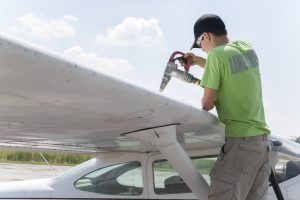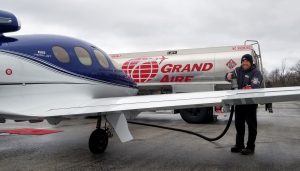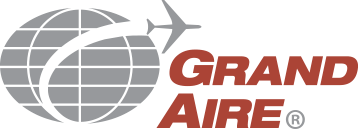What Kind of Fuel Do Airplanes Use?
Commercial airplanes, private jets and general aviation aircraft all need fuel to get off the ground. Think they use the same gasoline that you put in your car? Think again.
There are two main types of aircraft fuel: Jet Fuel and Aviation Gasoline (AVGAS). While they are similar in nature to unleaded gasoline like you use in your car, they have some crucial differences in their properties which are essential in flying.
Jet Fuel
Jet fuel is a clear, refined kerosene-based type of fuel. It is used for aircraft with turbine engines, like jet engines and turboprops. Large commercial airplanes use jet fuel since they are commonly built with turbine engines.
There are several types of jet fuel, but the main ones are Jet A and Jet A1. Jet A is primarily used in the United States. It is heavier than standard kerosene and has a higher flash point (point of catching fire). Jet A’s freezing point is -40◦C.
Jet A1 is the most common jet fuel used worldwide. Due to its lower freezing point (-47◦C), Jet A1 is more suitable for international travel through varying climates. This type of fuel also contains a static dissipater additive. This type of additive helps to decrease static charges that could form during movement.
Despite their differences, Jet A and Jet A1 fuels can be used interchangeably. And although jet fuel is used to operate massive engines, its price is cheaper because of its simple refining methods.
Aviation Gasoline
Known as AVGAS, this type of fuel is used in small piston-engine and propeller airplanes. These types of airplanes are used on a smaller scale for tasks such as private flying, crop-dusting and flight training.
There are two main types of AVGAS: AVGAS 100 and AVGAS 100LL. The number 100 refers to the octane rating in each variety. The octane rating is the measure of a fuel’s ability to resist “knocking” or “pinging” during combustion.
Both types of aviation gasoline contain a tetraethyl lead additive. Tetraethyl lead is added to help prevent the aforementioned “knocking” that could lead to engine failure. AVGAS 100, which is dyed green, has a high lead content. AVGAS 100LL (LL = low lead) includes low amounts of tetraethyl lead and is dyed blue. The main difference between these two types of fuel is the percentage of tetraethyl lead additive included.
AVGAS is more expensive than jet fuel. However, due to the larger number of planes that use AVGAS, its sales volume is higher.
Aviation Fuel vs. Gasoline
There are many reasons why airplanes don’t use regular gasoline to fly, and vice versa. In general, aviation fuels have been precisely formulated for the stringent conditions and engine operating demands that come with flying an aircraft. They are heavier than standard gasoline, have a higher flashpoint and a lower freezing point.
The octane level recommended for propeller and small piston-engine airplanes is 100, as found in AVGAS. In automotive gasoline, it varies from 87 to 93. While it is generally safe to operate an engine with a higher octane level than required, it is not safe to use one that is lower.
Conversely, using aviation fuel in an automobile won’t work. Jet fuels, which are primarily kerosene, simply can’t make a gas engine run. And the tetraethyl lead additives found in AVGAS, which serve as a lubricant for the plane’s engine would ruin components such as the catalytic converter in a standard vehicle.
Fueling Your Plane at KTOL
Grand Aire proudly operates the only 24/7/365 full-service FBO on the field at the Eugene F. Kranz Toledo Express Airport (KTOL). While we do have our own fuel field for aircraft fueling, we also offer de-icing, high-tail hangar space, customs clearing assistance, crew cars, baggage handling, aircraft catering and more.
Our newly renovated FBO, with its stunning yet comfortable waiting area and modern snacking lounge, stands ready to welcome you, should your travels bring you to KTOL. Have questions? Give us a call at 1-800-70-GRAND. You may also email our team directly at fbo-lineservice@grandaire.com.
